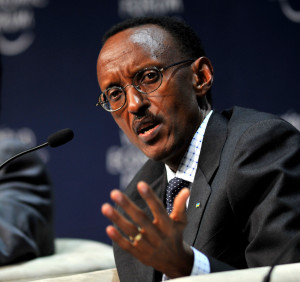A Rwandan refugee interviewed last month for BBC News was found tortured and unconscious in Uganda’s capital Kampala on Tuesday (August 27) after he had accused Rwanda’s army of forcibly recruiting him to fight in the Democratic Republic of Congo (DRC). The incident comes as the government of Rwandan President Paul Kagame faces renewed accusations over its alleged support for the M23 rebel group, currently mounting a fierce resistance campaign against a new United Nations intervention brigade in the eastern DRC.
Pascal Manirakiza was one of four Rwandan asylum seekers in Uganda to grant the BBC an interview in July making allegation about the Kagame government’s recruitment practices in support of the M23 movement and accusing the president of being “commander-in-chief” of the rebel group. Manirakiza had been missing for a week before he was found by Ugandan police in a cemetery with evidence of torture on his body. While he has yet to regain consciousness to give an account of his abduction, fingers are being pointed at Rwanda’s security services, who have a reputation for aggressively pursuing defectors over international borders.
Manirakiza’s is one of several recent cases highlighting Rwanda’s tough pursuit of exiles, including the high-profile defection of Lt. Joel Mutabazi, who formerly served as Kagame’s bodyguard. Kigali, Rwanda’s capital and administrative centre, has vehemently denied the claims of these exiles while issuing Interpol notices for their arrest. Despite being under the protection of the UN High Commission for Refugees, Mutabazi was arrested by Ugandan police last week. The recent spate of abductions of Rwandan exiles prompted an outcry from the UN, which intervened on Mutabazi’s behalf, forcing Kampala to block his extradition back to Rwanda last Thursday.
In light of UN’s new mission next door, international attention has been renewed around the M23 issue and Rwanda’s role in fomenting instability in the eastern DRC. With parliamentary elections coming up in Rwanda this September, this could hardly be a more inconvenient time for the Kagame government to face the heightened scrutiny, perhaps explaining the ramped up pressure on its opponents domestically and abroad. However, cases like Manirakiza’s and Mutabazi’s only seem to underline the Kagame government’s authoritarian tendencies and reinforce the accusations they continue to deny so vociferously. Unfortunately, with their Ugandan allies playing reluctant host to many of these exiles, Kigali may have some latitude to go after its fleeing opponents without fear of major blowback from any party more threatening than the UN – bad news for Manirakiza and his fellow Kagame-critics.










